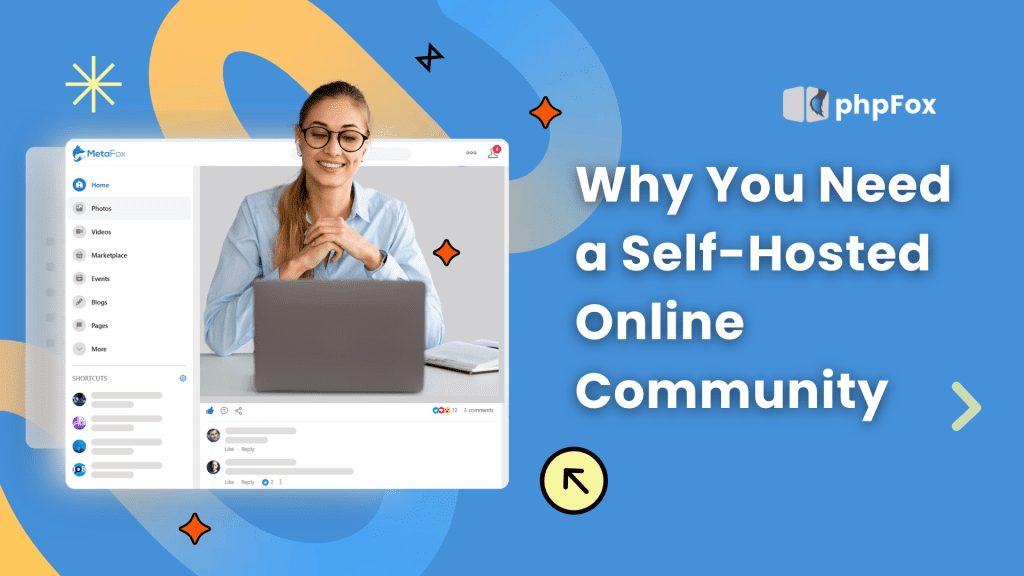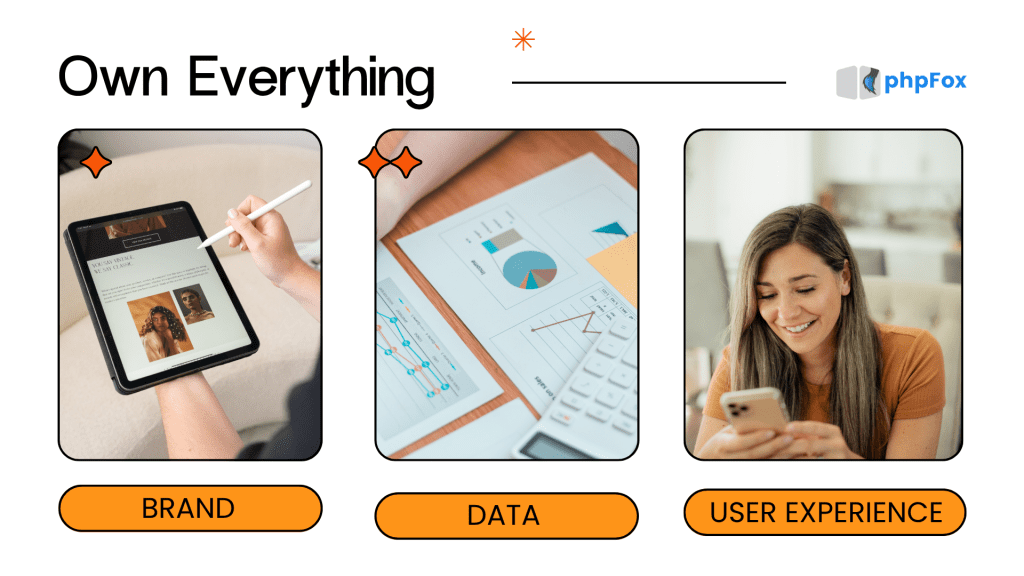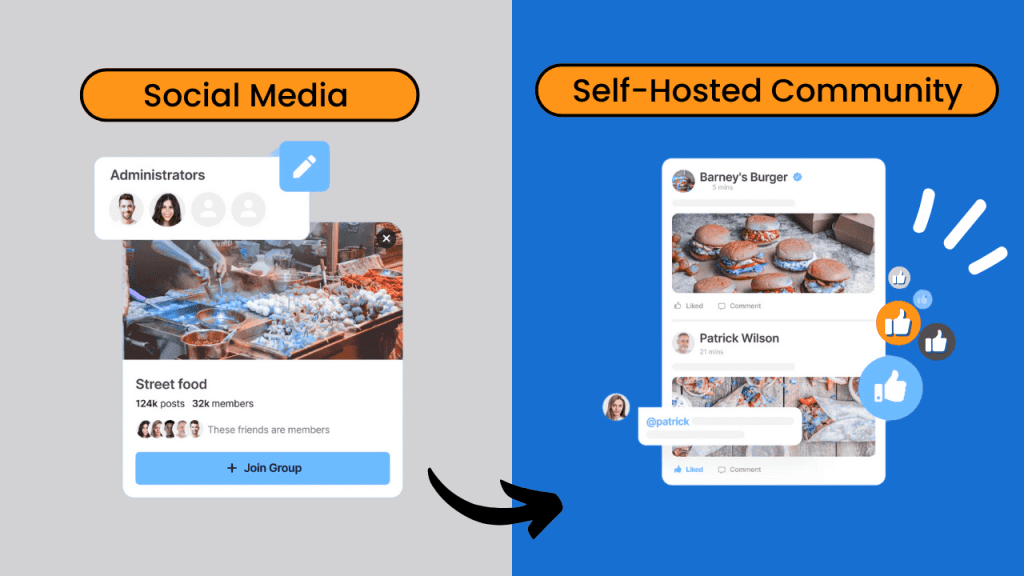
Imagine spending years building your community, growing your follower base, engaging every day—only to wake up one morning and realize your visibility has vanished. A platform changed its algorithm. Your group got flagged. Your reach dropped to near zero. And suddenly… your community isn’t really yours. That’s the risk of building on borrowed land.
Many creators, entrepreneurs, and niche brands start their community journey on popular social platforms like Facebook or Discord. It’s easy, free, and fast. But as your vision grows and your audience deepens, so does the need for control—over your data, your brand experience, and your community’s future. That’s where a Self-Hosted Online Community comes in.
A self-hosted online community lets you own the full experience—from branding and member data to monetization and growth strategies. It’s not just about features. It’s about freedom. It’s about building something on your own terms.
In this post, we’ll explore why self-hosting your community is one of the smartest long-term decisions you can make—and how it gives you the security and flexibility that generic social platforms can’t.
Table of Contents
The Pitfalls of Building on Social Media
Social platforms are designed to keep people on their turf—not yours. While they may offer a quick start for growing your audience, they come with serious limitations once you begin building something real and lasting.
Here’s what that looks like:
You Don’t Own the Rules
Algorithms shift overnight. One day your content reaches thousands, the next day… crickets. When you build your community on someone else’s rules, you’re at the mercy of their decisions, not yours.
Limited Customization
Want to shape your member experience? Set up exclusive access? Design a journey that feels 100% on-brand? Good luck. Most social platforms offer rigid templates and generic experiences that leave no room for your brand’s identity to shine.
Monetization Barriers
You have a passionate community—but turning that into sustainable revenue is hard when you can’t control the data, user flows, or payment options. Many platforms take a cut or block monetization altogether.
No Real Ownership
The harsh truth? You don’t own your members. You’re building your business on rented land. If your group gets shut down or your account suspended, you lose access overnight—with little to no recourse.
Why Self-Hosted Online Community Empowers Serious Community Builders
If you’re not just gathering followers for fun, but building a community platform as a part of your business, like a membership, a learning experience, or a movement, you need more than a social media group. You need full ownership, flexibility, and freedom. That’s where a self-hosted online community platform like phpFox comes in.
These platforms are designed for businesses looking to build strong online communities for their audience, clients, or students, often with clear goals for monetization and growth.
Here’s why that matters:
You Own Everything—Brand, Data, and Experience

With a self-hosted solution, you’re not just managing a community—you’re building a digital asset. You control your members’ data, content, and interactions. That gives you the power to make data-informed decisions, segment your users, and tailor their experience.
Think of it like this: social media gives you visitors. A self-hosted platform gives you residents.
Tailored Experiences for Growth and Retention
Generic feeds don’t create loyalty. With a platform like phpFox, you can design custom member journeys, segment user roles, and gate content. Whether you’re running courses, organizing niche groups, or offering premium content, your platform grows with you.
More Monetization Freedom
When you self-host, you’re free to monetize however you choose—subscriptions, in-app purchases, digital products, or exclusive access. You set the terms, keep the profits, and scale without friction.
Security and Stability You Can Count On
Building your own space means no sudden bans, shadow bans, or policy surprises. phpFox allows you to host your platform securely, control user permissions, and ensure your community thrives without interruptions.
Scalability Without Platform Lock-in
Unlike plug-and-play options or social media workarounds, a self-hosted platform scales with your ambitions. You can add new features, integrate third-party tools, and adapt your infrastructure as your needs evolve.
How to Transition from Social Media to a Self-Hosted Online Community

If you’re already running a group on Facebook, LinkedIn, or Discord, you’re not starting from scratch—you’re upgrading. Shifting to a self-hosted platform like phpFox isn’t about abandoning your audience. It’s about building a space where your community can truly grow, without limits or distractions.
Here’s how to make that shift seamlessly:
1. Clarify the Value of Moving
Start by identifying what your community will gain on a dedicated platform:
- Exclusive content and courses
- More meaningful discussions (without algorithms)
- Better privacy and data security
- A branded, clutter-free environment
Clearly communicate this to your current followers so they understand why it’s worth the move.
2. Set Up a Branded, Engaging Space
Your self-hosted platform should reflect your brand and values from day one:
- Customize the design and navigation
- Structure your community around topics, roles, or memberships
- Use phpFox’s modules to add forums, groups, events, and private messaging
This is your chance to go from “just another group” to a true digital hub.
3. Use Social Media as a Funnel, Not a Home
Don’t abandon your social channels—repurpose them as top-of-funnel touchpoints. Share snippets, conversations, or testimonials that direct users to your phpFox-powered community where the real action happens.
You’re not deleting your Facebook Group. You’re upgrading it to your own platform where you call the shots.
4. Offer Incentives for Early Movers
Encourage migration by rewarding early joiners:
- Exclusive content
- Access to founder-level perks
- Community shoutouts
- Limited-time discounts if your platform is monetized
What to Look for in a Self-Hosted Online Community Platform (and Why phpFox Stands Out)
Building a thriving self-hosted online community isn’t just about features—it’s about freedom, flexibility, and future-proofing. The right platform supports your growth, reflects your brand, and empowers your members.
Here’s what really matters when you’re choosing a platform—and how phpFox rises to meet those needs:
1. Full Ownership & Data Control
Your brand. Your data. Your rules.
When you go self-hosted, you should have total control over your community experience.
With phpFox: You keep full ownership of your data, content, and source code access to the platform. No algorithms. No third-party restrictions. You make the rules.
2. Customizability Without Limits
Your community is unique—your platform should be too.
phpFox allows you to customize everything—from layouts and features to member access and user flows. It’s fully white-label and endlessly adaptable.
3. Ready to scale
Start small. Grow big. Stay stable.
Whether you’re launching with 10 members or scaling to 100,000, you need a platform that grows with you.]
phpFox is built for scale, it supports large communities with powerful backend performance, CDN support, and flexible modules.
4. Built-in Monetization Tools
Turn your community into a sustainable business with native monetization. Launch memberships, paid groups, ad placement, or even a full eCommerce setup—right out of the box with the phpFox platform.
5. Rich Social Features that Bring People Back
Because connection is the core of community.
Give your members more than a forum—give them a place to belong.
With phpFox: Groups, messaging, reactions, live video, forums—it’s all there, designed to keep people engaged and coming back.
Ready to Build Something That Lasts?
Your community isn’t just another audience—it’s your brand’s foundation, your customer base, your movement. Don’t risk building it on rented land where the rules can change overnight.
With phpFox, you get the power to own your platform, shape your experience, and scale on your terms.
